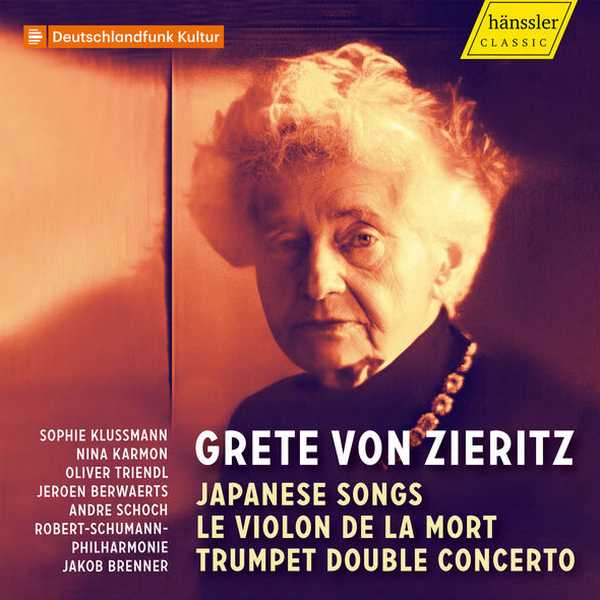
Composer: Grete von Zieritz
Performer: Sophie Klussmann, Nina Karmon, Oliver Triendl, Jeroen Berwaerts, Andre Schoch
Orchestra: Robert-Schumann-Philharmonie
Conductor: Jakob Brenner
Format: FLAC (tracks)
Label: Hänssler
Catalogue: HC23065
Release: 2024
Size: 1.08 GB
Recovery: +3%
Scan: yes
Zieritz: Japanese Songs for Soprano and Chamber Orchestra
01. Freunde (Saito)
02. Zieritz: Sommerduft (Mitsune)
Zieritz: Japanese Songs for Soprano and Chamber Orchestra
03. Fern von dir (Idzumi Shikibu)
04. Erinnerung (Kibino)
05. Am heiligen See (Ohotsuno Ozi)
06. Das Alter (Kintsune)
07. Komm einmal noch (Idzumi Shikibu)
08. Rückblick (Onono Komachi)
09. Einsamkeit (Muneyaki)
10. Japan (Yakamochi)
Zieritz: Le Violon de La Mort (Danses Macabres), Duo Concertante for Violin, Piano and Large Orchestra
11. Entrée. Mit rhythmischer Vehemenz
12. Marche des Ombres. Nicht zu schnell
13. Valse.
14. Lamentation
15. Cancan phantastique. Allegro
Zieritz: Double Concerto for Two Trumpets and Orchestra
16. Allegro con brio
17. Notturno. Larghetto
18. Allegro assai
“This CD – significantly only the second CD dedicated exclusively to von Zieritz – presents a longitudinal section of her oeuvre. It begins with the Japanese Songs, written in 1919, here in the version for soprano and chamber orchestra from the 1980s. The centrepiece is Le Violon de la Mort, composed in 1953 for violin and piano and arranged for violin, piano and orchestra in 1957, as well as the trumpet double concerto of 1975, the final piece and, as it were, a satyr play. Like Hans Bethge’ s collection Die chinesische Flote (The Chinese Flute) from 1907, the poetic model of the Japanese Songs belongs to the context of interest in exotic art of the fin de siecle. Gustav Mahler made Bethge’s poems the basis for a large symphonic work; Grete von Zieritz took the opposite approach with the Japanese Songs. These are a kaleidoscopic sequence of the briefest miniatures. It would hardly be possible to do otherwise, since the Japanese models are not song texts in the European sense, but poetically condensed sayings that defy conventional song settings. Aphoristic brevity was the order of the day.”



